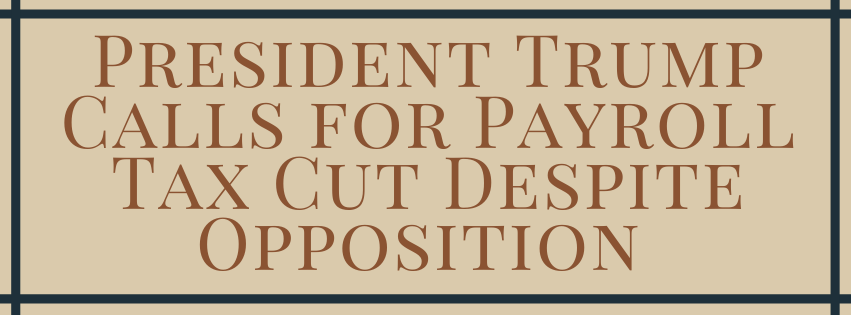President Donald Trump has called for a payroll tax cut in response to the COVID-19 crisis, saying “I like the idea of payroll tax cuts. I’ve liked that from the beginning. A lot of economists would agree with me. A lot of people agree with me,” at a press conference held on April 27th. Realistically, there has been very little support for such a cut. Instead, recent bipartisan relief efforts, such as the $2.2 trillion stimulus bill (known as the CARES act) passed in March, have focused on tax credits for employers as well as stimulus checks for individuals. Still, the president and a vocal minority maintain that a payroll tax cut should be included in the next aid legislation package.
What are payroll taxes?
Payroll taxes are a 6.2% levy paid by employees on wages earned in their paychecks. These taxes are used to fund federal programs such as unemployment insurance, Medicare, and Social Security. In most cases, an additional 6.2% levy is paid by the employer on behalf of the employee. Independent contracts and self-employed individuals are responsible for both portions of their payroll taxes.
What do other people say?
Neither conservative nor liberal politicians seem to be in favor of a payroll tax cut. The left side of the political aisle favors more funding for state and local governments, who are struggling in the midst of the pandemic, as well as a second round of stimulus checks to individuals and potentially further tax credits to employers who avoid furloughs and layoffs. A change to the payroll tax code, they say, is simply a way for the conservative party to further their agenda to cut and/or privatize Social Security.
Some conservatives, such as Senate Majority Leader Mitch McConnell, think the idea is too costly, since suspending payroll taxes for 3 months would cost approximately 300 billion dollars. Instead, McConnel suggests legislation to help business owners reopen the economy by shielding companies from lawsuits from those who contract COVID-19 at their places of business.
Politicians on both sides seem to agree that such a cut would not do enough to help those who have lost their jobs or been placed on furlough due to the pandemic. Since the national unemployment rate is somewhere between 10 and 20%, the worst it has been since the Great Depression era, this is an important concern. In addition, cutting payroll taxes may have negative long-term effects on Social Security, potentially causing funds to run out sooner than previously anticipated.
Effect on Unemployment
Payroll tax cuts do not tend to affect employment in a meaningful way, according to Tax Pro Today. The March stimulus bill already allows employers to defer their portion of payroll taxes and repay them in 2021 and 2022, easing the burden on businesses while still protecting funds in the long-term.
As both democrats and republicans attempt to reach a compromise regarding what should be included in the next Coronavirus aid legislation package, it seems clear that a payroll tax cut is unlikely to be included. For updates on current legislative activities, you can visit Congress’s website here.
